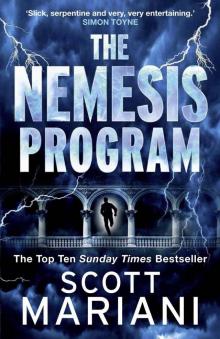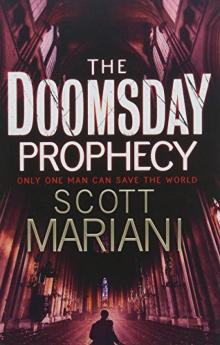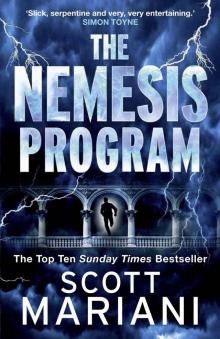- Home
- Scott Mariani
The Shadow Project bh-5 Page 7
The Shadow Project bh-5 Read online
Page 7
‘No children,’ Dorenkamp said. ‘There is just him, his wife Silvia and their nephew, Otto Steiner, who is in line to take over the business when Herr Steiner retires.’ He chuckled. ‘Though I find it difficult to imagine that he ever would. Perhaps at the age of ninety-nine, when Otto is nearly seventy himself.’
‘Where does Otto live?’ Ben asked. ‘Here, on the estate. He has his own villa within the compound.’
‘What about Otto’s parents?’
‘Sadly deceased,’ Dorenkamp answered. ‘It was a long time ago. A car accident. Please don’t mention it to Herr Steiner. He was extremely attached to his brother Karl.’
‘I won’t say a thing. Now tell me about Mrs Steiner.’
As he said it, Ben could hear the sound of someone playing the piano from a room somewhere nearby. Someone very good. The piece they were playing was fast and intricate, the kind of thing only a real virtuoso would attempt. It might have been Rachmaninov or Chopin – Ben wasn’t sure.
‘You are listening to her,’ Dorenkamp said with a smile. ‘She was once a concert pianist, before Herr Steiner and she were married.’
‘What does she do now?’
Dorenkamp shrugged. ‘She has her music, and he has his work. They spend each day largely in their separate worlds, and they dine together in the evenings when he is not working late or away on business. It is a simple and unobtrusive life they lead, despite their wealth. There isn’t much to say. Frau Steiner tends to remain here on the estate. She has everything she needs.’
It seemed like a lonely life, Ben thought as they walked on and left the sound of the piano behind them. He followed Dorenkamp up two sweeping flights of stairs to the second floor. The PA stopped outside a grand double doorway. ‘Here we are,’ he said and twisted the ornate bronze knob to push open one of the huge doors.
Ben followed him inside, and found himself gazing around him at the enormous conference room. Sunlight streamed in through French windows overlooking the estate and the mountainscape in the distance. A massive oak table was surrounded by some thirty buttoned leather chairs. The ceiling was high and ornate, and the walls were lined with arrangements of shields and old swords, from cavalry sabres to fifteenth-century claymores. In between the weaponry displays hung more gilt-framed paintings. Around the edges of the room were display cabinets. Ben wandered over to one of them and bent down to peer through the glass at the old letter inside. The paper was yellowed, the quill-penned handwriting flamboyant. Ben read the signature at the bottom and turned to Dorenkamp. ‘Is this an original Napoleon Bonaparte letter?’
‘One of several in Herr Steiner’s possession,’ Dorenkamp said.
‘I gather he’s something of a collector.’
‘It’s quite a passion of his, in fact.’ Dorenkamp motioned towards the table. ‘Please take a seat, gentlemen. Herr Steiner will be joining us shortly.’
Ben and the team pulled up chairs and settled around the table. Nobody spoke to Ben, and he in turn ignored everyone. Dorenkamp pulled up a chair near the top of the table, to Ben’s left. The PA checked his watch again, and turned expectantly towards the door.
Ben heard footsteps outside in the corridor and, a moment later, the door swung open and Maximilian Steiner walked into the room.
Chapter Fourteen
Ben and Dorenkamp got up from their seats as Steiner entered, and the rest of the team followed their example.
Steiner might have been approaching his mid-sixties, but he looked several years younger. He was about Ben’s height, a shade under six feet tall, though heavier in build. He exuded an air of seriousness and absolute self-confidence as he scanned each face in the room in turn intently, as though he could read their thoughts. His reddish-brown hair was still thick, turning just a little grey above the ears. He was wearing an elegant light grey suit and a formal navy tie.
His cool gaze settled on Ben, and his eyes narrowed. ‘You must be Captain Shannon’s replacement.’ He spoke with even less accent than his PA. ‘Mr Benjamin Hope.’
Ben groaned inwardly. Benjamin again. This was Shannon’s doing. ‘Please call me Ben,’ he said, avoiding the issue.
Steiner raised an eyebrow. ‘I prefer a more formal address, Mr Hope.’
Ben smiled. Fine, have it your way. ‘Then you can call me Major Hope,’ he said. Pulling rank wasn’t something he normally liked to do, but he was damned if he was going to stand in Shannon’s shadow.
Steiner shot a glance at Dorenkamp. ‘We were not informed of this.’
‘Must be a glitch in your communications,’ Ben said. ‘I served with the British Army, Special Air Service. Rank of Major, retired.’ He felt like adding ‘and it’s Benedict Hope, not Benjamin’ – but he didn’t want to make Shannon look too foolish. Just a little bit.
Steiner gave a curt little nod. ‘Now to business,’ he said, moving on briskly. Clearly not a man to dally over small talk, Ben thought.
‘You know why you are here,’ Steiner continued. ‘I have no doubt that the recent attempt to kidnap me will not be the last. While the perimeter of the estate offers full protection from intruders, I cannot remain a hermit. I have businesses to run, places to go and people to meet. Your team’s assignment is to protect me whenever I leave home.’
‘Have you left the estate since the attack?’ Ben asked.
Steiner shook his head. ‘I have not. An intolerable situation that cannot be allowed to continue.’
‘Is there anything you can tell us about the kidnappers?’ Ben said, thinking of what Dorenkamp had told him. ‘The more we know, the more we can anticipate their moves. It might be worth liaising with the police, as the investigation is ongoing.’
‘The police are useless,’ Steiner answered harshly. ‘There will be no need for that. But I do have an idea who is behind this, and am happy to share the information with you.’ He cleared his throat.
Happy to share. Ben felt like saying something about that, but instead he kept his mouth shut and waited for more. Across the table, Dorenkamp looked uneasy.
‘It is my belief that the kidnappers have a political motive,’ Steiner went on. ‘Of a very particular sort. You may have noticed my interest in collecting objects of historical value.’ He waved a hand at the mounted swords and the display cabinets. ‘One of the items in my collection, which I do not keep on display but securely under lock and key, for reasons that will become apparent, is a certain set of documents – design notes to be exact – dating back to 1944. Not especially old, then, but of enormous historical interest. The author of these extremely rare papers is one Hans Kammler, a wartime design engineer as well as an Obergruppenführer of Adolf Hitler’s Schutzstaffel.’
In plain language, an SS general, Ben thought.
‘It is my belief,’ Steiner went on, ‘that the kidnappers are interested in obtaining the Kammler papers from me, by force or coercion.’
‘Why?’ Ben’s question cut through the silence. It was perhaps a little more direct than Steiner liked, judging by the glint of disapproval in the man’s eye.
‘Because, Major Hope, Hans Kammler was the engineer in charge of Hitler’s SS Buildings and Works Division in the closing years of World War Two, and the mastermind and designer of the death camps. And because I further believe the kidnappers to be neo-Nazi activists who have falsely persuaded themselves that within these documents is proof that the historical records of the Nazi Final Solution have been grossly exaggerated, possibly even made up.’
‘Holocaust deniers,’ Ben said.
Steiner nodded. ‘Correct, Major. As you obviously know, ever since the war, a growing number of twisted neo-fascists have been intent on demonstrating that the Allied forces simply fabricated much of the evidence of the Holocaust as a means of vilifying Hitler and justifying their own atrocities. Kammler’s papers are quite certainly the most detailed plans in existence of what the Nazis really did at Auschwitz and the other death camps.’
‘One question. How do you know that the kidnappers a
re neo-Nazis? Were they chanting “Sieg Heil,” wearing armbands and leather boots?’
Steiner clearly didn’t appreciate the humour. He stared icily at Ben. ‘Because one of them had a swastika tattoo on his hand.’
‘So do a lot of British football hooligans,’ Ben replied. ‘It doesn’t necessarily prove anything.’
‘Though I don’t believe that the typical football hooligan would be interested in the Kammler papers. Herr Dorenkamp has described the kidnap incident to you?’
‘He has.’
‘When the police car arrived on the scene and inadvertently foiled the attempt, the thug who was holding my arm—’
‘The one with the tattoo.’
‘On the hand that was clutching the pistol pointed at my head,’ Steiner said coolly. ‘This thug began to scream “Where are the Kammler documents?” At that point, one of his fellow kidnappers urged him to keep quiet and let me go, and they retreated to their vehicle.’
‘Sounds fair enough to me,’ Neville said from across the table.
Ben hesitated for a moment. ‘Another question, Herr Steiner. This all has to do with these Kammler documents, correct?’
Steiner replied with a slow nod and a narrowing of the eyes.
‘And these people believe the documents contain certain proof, but you’re saying that’s a fallacy. That there’s no such proof in them at all.’
Steiner looked uncomfortable. ‘Correct.’
‘Then why don’t you just go public with them? Put them on display in one of the many museums that would be delighted to have them, and show the world what they really say? If your theory is right, you’d be destroying the kidnappers’ whole incentive to get hold of them.’
Steiner stared at him with a look that said: ‘Aren’t you asking questions above your pay grade?’
Dorenkamp interjected. ‘An interesting point, Major. But not directly pertinent to the issue at hand.’
Ben shrugged. ‘You’re wrong,’ he wanted to say. But he stayed quiet, and wished he’d said nothing at all. It struck him as ironic that, if he pressed the point, he risked ruining Shannon’s contract altogether by solving the problem too quickly.
‘Now,’ Steiner said. ‘To other matters.’ He turned to Dorenkamp with a barely perceptible gesture of his hand, and the PA quickly got up and left the room. There was silence around the table as Steiner’s gaze swept slowly around from man to man. Ben watched him. Across the table, he saw Neville looking down at his hands as Steiner’s eyes fixed on him.
After a moment Dorenkamp returned. With him were two men in dark suits, each carrying a shiny aluminium flight-case about two feet long. Dorenkamp directed the men over to the table. They carefully laid the cases on its shiny surface, then turned without a word and left the room. The PA flipped open the metal catches on each case, then lifted each lid in turn and stepped back.
Steiner’s gaze settled on Ben. ‘Please,’ he said, motioning to him. Ben got up from his seat and walked over to the open cases and looked down at what was inside them. He looked, blinked, looked again.
‘What are these?’ he asked Steiner. His consternation must have showed in his voice, because he caught an edgy look from Dorenkamp, as if to say ‘Don’t question him like that.’
‘These are the items I have provided for you to use in your protective role,’ Steiner said.
Chapter Fifteen
Ben looked back at the contents of the cases. Each box had a cavity cut out of its foam lining, and inset into each recess was a weapon, brand new and shining under the lights.
‘Naturally, what you see is only a sample,’ Steiner said with an air of indifference. ‘Each team member will be issued his own.’
Ben didn’t reply. He reached down and picked one up. ‘You are not familiar with this type of weapon?’ Steiner asked.
Ben turned the gun over in his hands. It was a double-barrelled device, with bores large enough to accommodate a wine bottle. It was bulky and clumsy in his hands. He knew what it was, and what it was for. A Flash-Ball rubber bullet gun, what riot and raid teams called a ‘non-lethal option’. At close to medium range its hard rubber projectile could deliver a blow roughly equivalent to a punch from a champion boxer. Enough kinetic force to knock a large human being to the floor and incapacitate them without doing any serious damage. Ben could think of a lot of situations where such a weapon would be extremely useful. Home defence in those countries that allowed it, to take down an intruder without having to kill them. Bounty hunters, who needed to soften a tough target and bring them in alive. In those situations, fine. Ideal.
But for the purposes of close protection they were worse than useless.
He put the weapon back in the box and turned to Steiner. ‘No chance,’ he said.
Steiner stared at him again. ‘I beg your pardon?’
‘I said no chance,’ Ben repeated. ‘These—’ He was going to say ‘Mickey Mouse pieces of shit’, but then thought better of it. ‘These weapons are completely unsuitable for our purposes. They’re heavy and clumsy and impossible to conceal, and they’re going to compromise our ability to protect you. They put us at a serious disadvantage in the event of a further kidnap attempt.’
Steiner just stared at him coldly. Dorenkamp was pale and wide-eyed. Across the table, Pete Neville was sitting back in his chair with his arms folded, glaring at him angrily.
‘In short, Ben said, ’they’re useless. I recommend you ditch them and get something more appropriate.’
‘And what exactly is it that you would recommend, Major?’ Steiner asked curtly.
‘In my experience, the Heckler & Koch MP5 machine carbine is a good companion to compact, concealable semiautomatic pistols such as the 9mm Glock, Browning or SIG,’ Ben said. ‘Whatever works.’ He pointed at the Flash-Balls in the cases. ‘These won’t.’
Steiner’s lips tightened. ‘No firearms. That is a contractual condition of your employment. I want you to protect me, but there must be no loss of life. I will neither tolerate bloodshed nor authorise the use of lethal force.’
Ben could see he was resolute. ‘Herr Steiner, these people who are after you aren’t playing. They’re evidently armed and serious.’ He paused, remembering what Dorenkamp had told him about Steiner’s anti-gun stance. ‘I understand your principles, and I admire them. It’s laudable that you want to avoid any kind of violence. Believe me, so do I. That’s what I’m here for. And the best way to avoid conflict is to ensure that we’re as well equipped as, or better equipped than, your enemies.’ Steiner shook his head.
‘Then I’d urge you to think about your family. Putting yourself at risk is one thing, but you also have the emotional interests of your wife and nephew to consider. I’ve seen too many families torn apart by kidnapping.’
Steiner’s face became even harder. ‘We are getting nowhere. Your proposal is out of the question.’ He threw a look at Dorenkamp.
‘The, ah, equipment requirements had already been discussed with Captain Shannon,’ Dorenkamp said weakly. ‘I’m surprised you weren’t notified of that.’
No, Ben thought. I damn well wasn’t. He sighed, knowing that he had no choice but to back down. In normal circumstances, in sane circumstances, if this had been his contract, being forced to use such inappropriate equipment would have been a deal-breaker. He would have found it unacceptable to risk the safety not only of his principal, but of the whole team. And any team leader who agreed to this kind of a deal was a cowboy. Shannon was clearly just agreeing to anything to get his hands on the money.
But Ben wasn’t here to make Shannon look incompetent in front of his employers. He was here to make reparations, not trouble. It was intolerable, but that was the way it was.
He took a deep breath before replying, ‘I apologise. You’re quite right. I was notified. It must have slipped my mind. We’ll make do with the items you’ve supplied.’
Steiner eyed him coolly. ‘Good. Let us move on to the subject of your first assignment. I am due to attend a
n extremely important meeting at a conference centre outside Lausanne early this afternoon. My presence there is vital, and I have no intention of letting a gang of Nazis prevent me from carrying on my business.’
Ben listened and nodded. It wasn’t a long drive to Lausanne. But far enough to be cautious. ‘I should have a look at the vehicles.’
Steiner shook his head. ‘We are not travelling by road. As team leader, you may travel with myself and Herr Dorenkamp in my personal helicopter. The rest of the team will follow in the second craft as arranged.’
This was just getting worse. Ben knew it was the wrong thing to do, but he had to say something. ‘I’m sorry, but that doesn’t seem entirely secure.’
Dorenkamp was staring at the tabletop with a weary look of resignation.
‘Why not?’ Steiner demanded.
‘Because in my experience it’s bad practice to separate the principal, in this case, you, from most of the team. If anything kicks off—’
But Steiner silenced him with a gesture. ‘I don’t have time to waste on a long road trip. The aircraft will reach the destination within half an hour.’
‘Fine,’ Ben said. ‘Then perhaps you’ll agree to let at least one of my team ride with me in the lead chopper?’
‘Regrettably, that is not possible,’ Dorenkamp cut in. ‘There are only five seats. Pilot, co-pilot, and three passengers.’
‘Then perhaps one of the men could take your place?’ Ben said.
Steiner shook his head impatiently. ‘I cannot allow that. I need my Personal Assistant with me at all times. We will have important matters to discuss in the air, prior to the meeting.’ He paused. ‘We are wasting time here. I had already discussed my schedule with Captain Shannon, who seemed perfectly content with the plans. I am surprised you did not know this either. Or perhaps you did, and this also slipped your mind?’
Shannon again. Ben was silent.
‘You are being paid to protect me, not to organise my business arrangements,’ Steiner added.

 Valley of Death
Valley of Death House of War
House of War The Pandemic Plot
The Pandemic Plot The Pretender's Gold
The Pretender's Gold The Demon Club
The Demon Club Passenger 13 (Ben Hope eBook originals)
Passenger 13 (Ben Hope eBook originals) The Nemesis Program_Ben Hope
The Nemesis Program_Ben Hope The Shadow Project
The Shadow Project Bring Him Back
Bring Him Back Passenger 13
Passenger 13 Sacred Sword (Ben Hope 7)
Sacred Sword (Ben Hope 7) The Sacred Sword (Ben Hope 7)
The Sacred Sword (Ben Hope 7) Sacred Sword
Sacred Sword The Babylon Idol
The Babylon Idol The Armada Legacy
The Armada Legacy The Heretic's Treasure
The Heretic's Treasure The Martyr’s Curse
The Martyr’s Curse DECOY (Kindle Single)
DECOY (Kindle Single) The Bach Manuscript
The Bach Manuscript The Alchemist's Secret
The Alchemist's Secret The Mozart Conspiracy: A Novel bh-2
The Mozart Conspiracy: A Novel bh-2 The Doomsday Prophecy
The Doomsday Prophecy The Ben Hope Collection: 6 BOOK SET
The Ben Hope Collection: 6 BOOK SET Star of Africa (Ben Hope, Book 13)
Star of Africa (Ben Hope, Book 13) Star of Africa
Star of Africa The Forgotten Holocaust (Ben Hope, Book 10)
The Forgotten Holocaust (Ben Hope, Book 10) The Devil's Kingdom
The Devil's Kingdom The Lost Relic
The Lost Relic The Armada Legacy bh-8
The Armada Legacy bh-8 The Rebel's Revenge
The Rebel's Revenge The Forgotten Holocaust
The Forgotten Holocaust The Lost Relic bh-6
The Lost Relic bh-6 Ben Hope 05 - The Shadow Project
Ben Hope 05 - The Shadow Project The Mozart Conspiracy
The Mozart Conspiracy The Nemesis Program
The Nemesis Program The Martyr’s Curse (Ben Hope, Book 11)
The Martyr’s Curse (Ben Hope, Book 11) THE TUNNEL: A Ben Hope Story
THE TUNNEL: A Ben Hope Story The Sacred Sword bh-7
The Sacred Sword bh-7 The Moscow Cipher
The Moscow Cipher The Shadow Project bh-5
The Shadow Project bh-5 The Tunnel
The Tunnel The Moscow Cipher (Ben Hope, Book 17)
The Moscow Cipher (Ben Hope, Book 17)